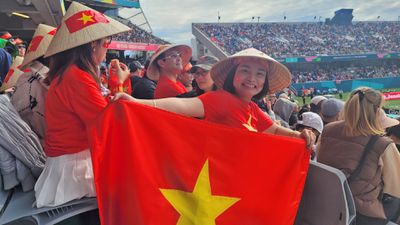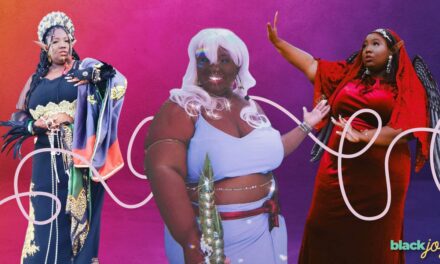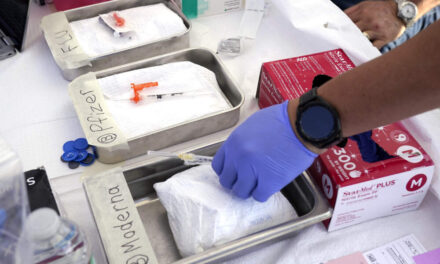The mood at the FIFA games has been in stark contrast to those at All Blacks tests. John Campbell thinks this is the beginning of a revolution in New Zealand sport.
This is meant to be an essay from inside the election campaign. But, in the immortal words of Milan Kundera: “When the heart speaks, the mind finds it indecent to object.”
So, I’m writing about the football. Or, at least, the football is my starting point.
This is not to say I haven’t been on the campaign trail. I have. All week. Auckland, Hamilton, New Plymouth, Waitara, Wellington. But last night, as a break from politics, I went to Japan v Sweden at Eden Park. Match 58 of the Football World Cup. (58!) And last Saturday, while shooting another story, I went to the All Blacks v Australia, in Dunedin.
ADVERTISEMENT
So, the past seven days began with men’s rugby and ended with women’s football. Both were great. But I’ve been reflecting on how they were different. And it occurs to me that we are witnessing a revolution that sport (in this country, anyway) desperately needs.
That it is being led by a FIFA product is truly unexpected. FIFA are revolutionary in the same way that Ronald McDonald is a vegan.
But it’s not just football. What’s been happening, since that first special night at Eden Park when New Zealand beat Norway and we were all, suddenly, alive to the sparkle of this tournament, reminds me of what we saw when the women’s Rugby World Cup was held here, last year.
Two World Cups. One of them football, one of them rugby. Both with the same sense of… what? Delight? Yes, but that’s not sufficient. I want to say, the same sense of being unbound. Of being liberated from the weight we have demanded the All Blacks carry.
And what do these two World Cups have in common? That they were both being played by women.
Sport played by women, with way more women and girls in the crowd, feels different. In part, the revolution is taking place in the grandstands.
When the Black Ferns were leading England in the final of the Rugby World Cup at Eden Park, last November, time almost up, England won a penalty that gave them a lineout in the corner. We all knew, that England would win the lineout, form a maul, drive the ball over, score and win the Cup. (They were so brilliant at this, it seemed inevitable.) The crowd was tense, yes, and full of disappointment for the Black Ferns, who’d played so wonderfully, but also, still, celebratory. And proud. There wasn’t the awful dread that descends over a New Zealand crowd on the rare occasion the All Blacks are in trouble. The immediate rush to blame. The visceral rancour.
ADVERTISEMENT
Joanah Ngan-Woo, of course, had other ideas. Up she went. Against the odds, against the inevitable, against gravity. We were on the other side of the field. It took a second to comprehend the Black Ferns had stolen the lineout. That Joanah had done something almost miraculous.
The game ended in a roar of exultation. Pure happiness.
I filmed it on my phone. Every time I watch it, I smile.
But it wasn’t just in the winning, almost anyone can look happy when they win, it was during the moments when things weren’t going so well that I began to truly appreciate how different this version of my beloved rugby felt. Even when the Black Ferns were behind, the crowd remained in a state of elation. We were watching something special, and we knew it. And “special” wasn’t contingent on the result.
Indulge me, if you have the time, and watch this: https://www.youtube.com/watch?v=69GtwpKXZaE It is that famous Rugby World Cup final, between the Black Ferns and England.
Zip through to 1:29:45 and watch the try Stacey Fluhler sets up for Ayesha Leti-I’iga. That pass is sublime. But in the process Stacey Fluhler gets injured. Keep watching. Stay with it for the next few minutes and see what happens as that brilliant player leaves the field: She smiles.
An extraordinary scene
ADVERTISEMENT
The crowd stands and claps, and Stacey Fluhler smiles and waves her gratitude back. She doesn’t just smile, she beams. It is an extraordinary scene. As moving as sport can be. And I don’t think I’ve ever seen an injured All Black, in an incredibly close Rugby World Cup final, feel able to leave the field like that.
The weight we give them is too leaden. Too dark. They have to win. And only then can they be happy. (And even then, we immediately begin to ask if they can keep the winning up.)
I was also there when the All Blacks won the men’s Rugby World Cup final in 2011.
Here’s the story of that day:
And that ended with an incredible roar, too. With an extraordinary triumph! But the 30 minutes before the final whistle, when France could have stolen the game at any moment, had carried a terrible dread. A kind of post-diagnosis silence. We didn’t lift the All Blacks, we burdened them. We held the weight of losing and gave it to the players to carry.
And that’s on us, in the crowd.
ADVERTISEMENT
Yes, I do think that’s also on male rugby, and the culture it orginally arose from. The taciturn. The boys don’t cry nonsense. The idea of masculinity as something dark and impenetrable. (Greg Bruce, by the way, writes about this brilliantly in his book, Rugby Head. It’s an outrage more people haven’t read it. His use of Buck Sheldford’s testicles as an allegory/window into our attitudes towards rugby is brilliant, funny, and also, if you’ll forgive me, nuts.)
Which brings me, because I’ve decided it will, back to the football.
I’ve been to Eden Park four times this tournament. It’s been full, or very nearly full, every time. And New Zealand were only involved in one of those games. Incredible. And it’s been full of different people, behaving in different ways.
The little girl sitting in front of me at the opening game, the Football Ferns v Norway, had brought her bunny. It one of those bunnies that’s been loved so much it’s 80% material and 20% dribble. She was there with her two older sisters and their mum and dad. She was so excited. Up and down she went. The Mexican wave was her favourite bit. About an hour into the game she put her head on her dad’s lap and fell asleep.
I have been to hundreds of rugby games since my own dad first took me to Wellington’s Athletic Park, 50-something years ago. But I’ve never sat behind a bunny before.
We went to the America v Vietnam game on a Saturday afternoon. We sat between American and Vietnamese supporters. The Vietnam fans told me they knew they weren’t going to win – but that didn’t matter. They were proud to be there.

ADVERTISEMENT
Megan Rapinoe warmed up right in front of us. Back and forth. Back and forth. Kicking her legs forward as she ran (as if dimissing a persistent wasp). Charisma travels though space. Everyone could sense we were close to someone special.
A fortnight later she missed a crucial penalty, to create the kind of desperately unhappy ending to her career that gives sport its meaning. Donald Trump, who cheats at golf, had a go at her. Your enemies define you as much as your friends. A player who demanded women be treated with respect, being slagged off by a man who disrespected an entire election.
All of this, the children, the bunnies, the supporters whose enjoyment is not entirely dependent on winning, the weightlessness of the crowds, the players adored because they’ve had the audacity to stand for something off the field as well as on it, the way players rise to great heights then plunge back to earth, felt real, and exciting.
And I don’t particularly like football!
Men’s football
Prior to this World Cup, I’d been to two games of football in my life. Two. IN MY LIFE!
1. Barnsley v. Port Vale at Oakwell, in Barnsley, South Yorkshire. An occasion so miserable that about 20 minutes into it I began to hope we’d be hit by a meteor shower.
ADVERTISEMENT
2. Barnsley v West Ham at Upton Park in London. Barnsley lost 0–6. It’s the only time IN WEST HAM’S HISTORY that they’ve won a premier game by six goals. I was there supporting Barnsley. We were escorted out by police on horseback. When a horse did a particularly large poo in front of us, a West Ham supporter loudly informed us that it still wasn’t as shit as Barnsley.
Men’s football.
Eden Park during the Women’s World Cup has been the opposite of that.
Here’s a funny thing. In 2020, when the All Blacks were having an awful time, Sam Cane, the team’s skipper, had a gentle go at their fans: “I think we have got amazing fans but we have also got some pretty brutal ones.”
Yup.
The fans, of course, me included, took this as the captain being defensive in the face of the team’s underperformance.
Maybe. But Sam Cane was also right.
ADVERTISEMENT
Last Saturday, as I mentioned, I was at Forsyth Barr Stadium (what a venue!) in Dunedin to watch the All Blacks play Australia.
New Zealand were down 17 – 3 at half-time. This was partly because we were terrible, and partly because the Wallabies were as good as they’ve been since I don’t know when.
The crowd didn’t know what to do. Cheer them on? Get cross? The silence began to take hold.
But the silence is aided and abetted by the classic hits music collection that’s played during every break in play. (EVERY F#@*#NG BREAK!)
We Will Rock You. (No. Please. DON’T!)

That song was released 46 years ago. It is to atmosphere what a fart is to a romantic dinner. At one stage, the All Blacks scored. A comeback was on! The crowd roared. Really roared! But even this real and organic human response was immediately drowned out by music.
ADVERTISEMENT
My guess is that the music was initially a way of making up for the lack of crowd participation at rugby games. So, again, we have ourselves to blame for it. But it’s become a faux atmosphere. So banal and invasive it has the effect of recusing the crowd from effort, and of drowning the effort out when it’s made.
One of the things I’ve learned about football by actually attending some games is that there are fewer breaks in play. Minutes pass – sometimes quite a few minutes – without there being any space to bludgeon us with another track from the Party Hits of the Seventies CD.
Where was I? (Other than frothing.)
Ahh, yes, back at the football. The women’s football. God, it’s wonderful to be in a crowd that makes noise, and is given the space to arrive at that noise on its own terms. At Portugal v USA you could hear the neutral supporters beginning to move from the USA to Portugal. It felt shared.
Like the women’s rugby, this makes you use the f word – fun. It also makes you understand the extent to which the All Blacks’ crowd, typically older, more upper-socio, and more male, doesn’t regard fun as what we’re there for.
Even the word, fun, feels like a kind of sacrilege.
We’re not here to have fun, until we’ve won. Prior to that, it’s about being as grim and intense as a formal warning.
ADVERTISEMENT
I’m not sure what the solution to this is.
Maybe rugby’s established, male order (that has told the men for years to be tepidly cautious versions of themselves off the field, and to be terrfied of getting it wrong on it) are learning the lessons that Ruby Tui and Stacey Fluhler and Portia Woodman have taught us, that you can be the best in the world and still be you while being it. Or the lesson that CJ Bott and Jacqui Hand taught me as I watched them from the grandstand in that game against Norway, that if you play without fear there’s a brilliant freedom in that.
And maybe the crowds at the men’s rugby will understand the lessons the crowds at the women’s rugby and football are teaching us. That being joyful elevates. That teams rise with it.
I hope so.
I hope the orthodoxy of male rugby, for so long the sport (and gender) by which we broadly defined ourselves, will notice the difference it makes when women play – and when there are more women and children in the crowd.
Suddenly, sport feels like a place with light in it.
It’s still about winning. (Don’t let some angry person tell you otherwise. Harrumph.) Every team wants to win. Every fan wants it to happen. But the pursuit of victory doesn’t have to be a sacred form of maschoism. A hair shirt.
ADVERTISEMENT
It’s on us, really.
Those of us who go to All Blacks’ games now know there are other ways of watching sport. Thank you, Black Ferns. Thank you, FIFA. (Sarai Bareman, take a bow.) It doesn’t have to be miserable until it’s completely clear we’re winning.
You realise what a folly that is when you’re watching the best women in the world play, in both football and rugby. And the crowds are popping off. And people are smiling, really smiling, even when things go wrong. And the players are inspirational and the standard is brilliant. And that unaccustomed feeling around you isn’t weight, or dread, or grim introspection and analysis, it’s joy.
* John Campbell writes about politics every Saturday morning (or, apparently, football, as the mood takes him).



